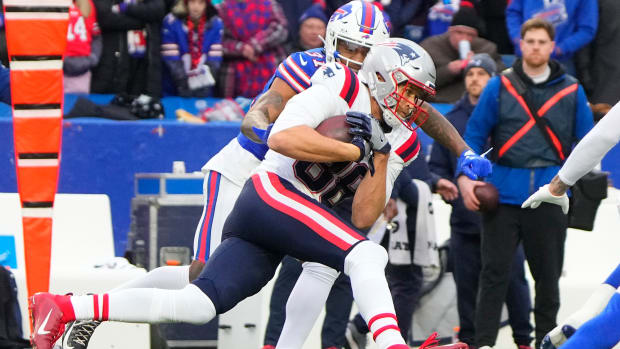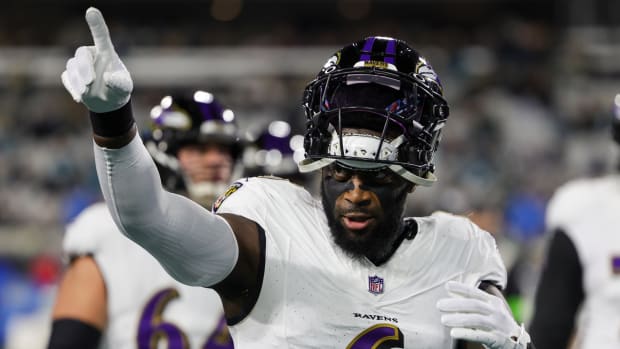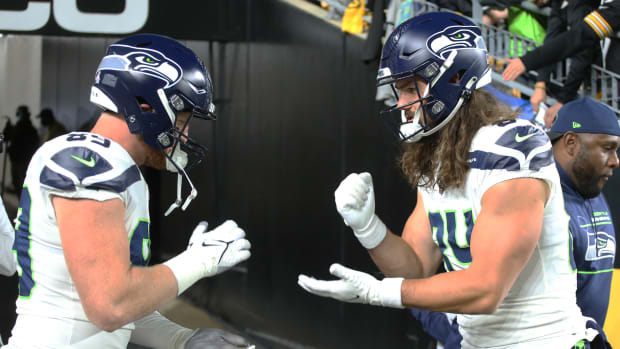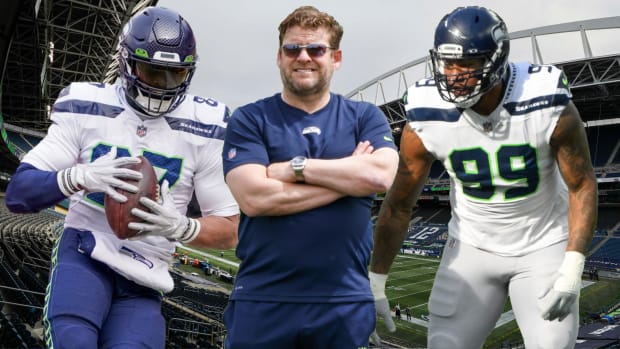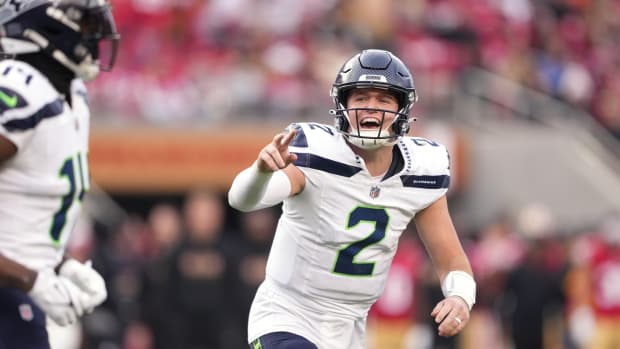Kyler Murray Extension Highlights Key Reason Why Seahawks Jettisoned Russell Wilson
As the star quarterback and franchise grew further and further apart in recent years, not one specific cause can be solely blamed for the rift between Russell Wilson and the Seahawks that eventually paved the way for their split this offseason.
Viewing himself as one of the elite signal callers in the game today, Wilson felt the offense wasn't being properly built around his talents. Off the field, he desired more input on personnel decisions as well as the offensive scheme the team would be running. Tired of getting battered to a pulp year in and year out, he demanded improvements be made to the offensive line charged with protecting him, airing his frustrations publicly in a series of interviews in February 2021.
Under the direction of coach Pete Carroll and general manager John Schneider, however, Seattle's brain trust remained adamant that the team would win with a balanced offense and quality defense. While Wilson would have some involvement in free agency decisions and helped pick Shane Waldron as Brian Schottenheimer's successor calling plays, he wasn't going to take over as the new general manager either. As for protection, moves were made to invest in the line to try to appease the quarterback, including trading for veteran guard Gabe Jackson.
With tensions boiling over for the aforementioned reasons to varying degrees, following a disappointing season for both the player and the team, the Seahawks shipped Wilson to the Broncos in March. In return, they acquired two first-round picks, two second-round picks, a fifth-round pick, and a trio of veteran players, including quarterback Drew Lock as a potential replacement.
As Wilson happily gets acclimated with his new team and posts videos on social media donning a new helmet at his private practice facility in southern California, it remains unclear which factors carried the most weight in a deteriorating relationship that reached a point of no return this spring.
But on the heels of the Cardinals handing Kyler Murray a four-year contract worth north of $45 million per year on Thursday, prior comments made by Schneider on March 16 when the Wilson trade became official highlight an issue that may have been more at the forefront of the divorce than realized.
Speaking with reporters hours before the start of free agency, Schneider was asked if the quarterback had told the team he had no intention of signing a new extension at the end of his current deal. Predictably, he didn't provide any specifics, but he confirmed that a new contract between Wilson and the Seahawks didn't appear to be in the cards.
“I don’t know if those were the exact words, but we were under the impression that there wouldn’t be a long term extension," Schneider responded.
Considering Wilson's escalating frustrations, the player himself may have told his agent Mark Rodgers he wasn't interested in another contract if the team didn't intend to let him be the centerpiece of their offense as he believed he should be. It's also possible that all of the apparent problems the two sides had with one another created a situation where a mutual parting was the only reasonable option, thus taking any future contract discussions off the table.
But when it comes to the timing of the Wilson trade, it would be remiss not to consider the possibility money lied at the heart of the decision from the team's perspective. While Schneider and Carroll indicated the Seahawks had been talking to the Broncos earlier and reports suggest the two teams began having conversations several months earlier, the deal was announced hours after the Packers reportedly inked Aaron Rodgers to a record-breaking deal.
After many speculated Rodgers would retire or play elsewhere in 2022, Green Bay locked him up the future Hall of Famer with a three-year, $150.8 million deal worth more than $50 million per year with $101.5 million guaranteed. Under the terms of the deal, he became the highest-paid professional athlete in North American sports history annually.
Before being sent to the Mile High City, Wilson still had two years remaining on the four-year, $140 million extension he signed before the 2019 season. But after Rodgers signed his new contract, a new baseline had been set for the nine-time Pro Bowler's camp to pursue his next mega contract and it's likely, if not certain, that Schneider grew weary of a price tag approaching $50 million for a quarterback set to turn 35 years old in November.
Although Schneider didn't reference cost in his explanation at all, he suggested the looming conclusion of Wilson's contract absolutely factored into Seattle's decision to pull the trigger and hit the reset button at the most important position in the sport.
“It did play in," Schneider said. "A certain extent at the very end when, Sunday night or whenever we were having our powwow, how is this going to go down? That played in."
Over the years, Carroll has long maintained that he wants a point guard playing the quarterback position who can run the offense and distribute the football effectively, hinting that he believed his team could win without having a superstar under center. Yet, the Seahawks willingly gave Wilson two massive extensions in 2015 and 2019, paying him elite signal caller money. For a brief moment, he was the highest-paid player in the NFL only three years ago.
But that extension was signed seven months before Wilson turned 31 and he remained in the prime of his career. He also was coming off a fantastic 2018 season in which he threw 35 touchdowns compared to only seven interceptions and averaged 8.1 yards per attempt while leading Seattle back to the postseason after a one-year hiatus.
While Wilson isn't old by any means and a right finger injury that required surgery played a pivotal role in his underwhelming numbers last season amid a 7-10 finish, the Seahawks may no longer have been comfortable with investing that much money in an aging player whose skill set has been predicated to an extent on using his legs and extending plays. Adding in his obvious discontent, there may have been even more hesitation on Schneider's part.
More than four months after the blockbuster trade went down and Rodgers inked his historic deal, as evidenced by Murray's new extension, other NFL teams continue to open up the checkbook to pay quarterbacks. In the near future, the Ravens will have to show former MVP Lamar Jackson the money. The Bengals will have to pony up the cash for Joe Burrow, who led the team to the Super Bowl a year ago, while the Chargers will have to back up the Brinks truck for Justin Herbert.
With so many talented young quarterbacks eager to cash in, it doesn't appear that salaries at the position will be plateauing anytime soon and the majority of teams will gladly keep pay the piper.
But in the case of Seattle, with a disgruntled quarterback in Wilson entering the second stanza of his career who didn't seem to want to be in town anymore anyway, that premium likely contributed to the organization making a move now rather than holding out hope for an extension in the future. In the process, Schneider was able to maximize the return with a boatload of draft picks and quality veterans while creating ample future cap space to hasten rebuilding efforts.
Of course, if Wilson tears it up with the Broncos and the Seahawks can't find a capable quarterback to step into his stead in the next two years, the choice to trade arguably the best player in franchise history could go down as a blunder of historical proportions. But that was a gamble they were willing to take and regardless of where his future cost ranked among their motives to move on, they will be judged and scrutinized by how quickly they return to contention without him.


